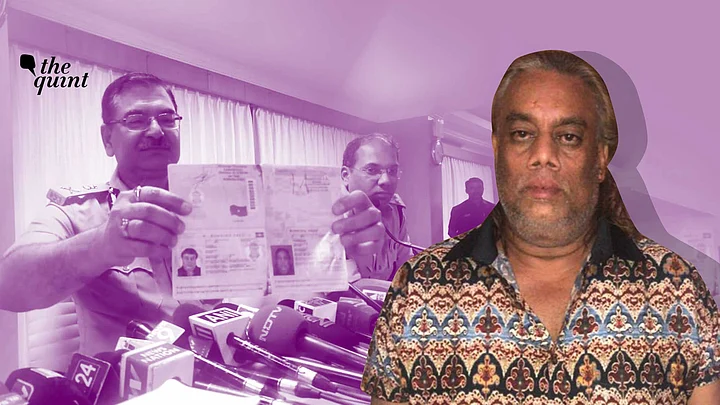Living under a false name of Anthony Fernandez, his attempts to become a 'social worker' ended gangster Ravi Pujari’s 26 years long run from the law. Pujari, who is wanted in 97 cases, including 12 cases of murder, was extradited to India from Senegal on 23 February.
Pujari, who was once part of Dawood Ibrahim’s gang and a close associate of Chotta Rajan, was arrested while getting his hair coloured at a local barbershop in Senegal on 19 January.
Announcing the arrest, Amar Kumar Pandey, Additional Director General of Police (Law and Order), said, "After a long chase of a ghost-like figure, it comes to a conclusion."
Pujari has been sent to 14 days of police custody.
Officers of Karnataka police were tasked with bringing the gangster back to India on 18 July 2018, after a fresh tip-off on his whereabouts emerged.
According to sources, a photograph of him attending a cricket tournament for Indians in Burkina Faso in west Africa provided the big breakthrough.
Lived on a Fake Name in Africa
“In Senegal, he was a reputed businessman,” ADGP Pandey.
After the gang wars posed a threat to his life, in 1994, Pujari left the country through Nepal. He then travelled to Bangkok and Uganda using a fake Indian passport acquired in Nepal, before settling down in Burkina Faso, said ADGP Pandey.
Pujari then assumed the identity of 'Anthony Fernandez', an alternate name given to him by his mentor, Chotta Rajan, during his days in the Mumbai underworld. Over the years, he entered textile and electronics businesses. He even opened a popular Indian restaurant called ‘Maharaja’ in the west African country.
During his stay in Burkina Faso, he gave up his Indian passport and took the host country’s passport, which he used to travel across the world, including the United States, Pandey added.
His restaurant, businesses and social work made him popular in the country. Pandey said that Pujari was involved in social work like distributing clothes, installing pump sets and other activities.
However, he continued to run his extortion business using his network in India.
The Tip-off and Arrest
Though wanted in 97 cases in Karnataka and other cases in Maharashtra, Gujarat and Kerala, Pujari eluded arrest for several years. In 2018, intelligence agencies received a tip-off that he was the partner in one of the popular Indian restaurants in Burkina Faso.
When the tip-off reached the Karnataka police, ADGP Pandey was given the charge of bringing the gangster back. The tip-off led to a joint operation by multiple Indian and international agencies. The breakthrough came when his picture appeared in a local newspaper in which he was seen attending a cricket match organised for the Indian community in December 2018.
It was later found that he had moved from Burkina Faso to Senegal. He was placed under surveillance and was arrested on 19 January 2019, while getting his long hair coloured in local barbershop, he was taken into custody by local police, executing the red corner notice issued against him.
The Karnataka police added that even though there is no extradition treaty between India and Senegal, bilateral talks helped in bringing the wanted criminal back.
A Strongman in Dawood’s Gang
Although born in a small village near the coastal town of Malpe in the Udupi district, Pujari grew up in Mumbai. He made his entry to the Mumbai underworld with the murder of a builder in Andheri in early 1990s. Over the years, he became a trusted lieutenant of Chotta Rajan, who was then associated with Dawood Ibrahim’s gang.
When Dawood and Chotta Rajan split after 1993 Mumbai blasts, he joined the latter’s gang. However, he had fallout with Rajan in the years that followed. He was responsible for attacking Rajan’s people and, in turn, was targeted by his rivals.
Long History of Crime
Cases against Pujari include threatening two Karnataka ministers — K Abhaychandra Jain and Ramanath Rai. In January 2018, the underworld operative allegedly made threat calls and sent SMSes to then Education Minister Tanveer Sait, demanding Rs 10 crore as well.
Following the controversy surrounding Jawaharlal Nehru University in New Delhi, he had allegedly made threat calls to student leaders Shehla Rasheed and Umar Khalid, and Kashmiri separatist Syed Ali Shah Geelani, in 2016.
However, most of his extortion attempts were directed towards builders and entrepreneurs. One of the first cases against him was for his alleged involvement in a fatal shootout against builder Subbaraju in 2001 in Bengaluru. He has been charge-sheeted in the case, but hasn’t stood trial.
He is also charge-sheeted for the shootout against realty firm Shabnam Developers, which left two dead in February 2007. This was followed by a shootout at HML Shipping in Mangaluru in in 2008.
His henchmen allegedly carried out a shootout at Bollywood production company UTV’s office in 2009, and at the office of Mantri Developers in 2010, both in Bengaluru. The last shootout attributed to him was against Bharati Builders in Mangaluru in 2014.
Some of the his attacks were attributed to gang war as well. In 2009, Ravi Pujari’s alleged henchmen murdered lawyer Naushad Kashimji, advocate for Rashid Malabari, a sharpshooter and an alleged associate of Chhota Shakeel.
(At The Quint, we question everything. Play an active role in shaping our journalism by becoming a member today.)
